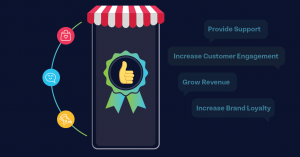
Big data explained for executives
AI, Internet of Things, and Big Data: three buzzwords that are zinging around the technology industry and are gaining traction in other industries too. However, some executives are wary of these customer engagement ideas and trends since they may not be as educated about them as they could be. Here’s everything that executives should know about AI, the Internet of Things, and Big Data.
You have the data you need… you just aren’t using it
If you have a successful business model, you most likely already have a huge pool of data about your consumers at your fingertips, such as what they have purchased, when they purchased it, and how they prefer to be contacted about future purchases. This is all collected from consumer interactions.
If you’re not using this data or you’re not centrally storing it for easy access, you’re wasting a resource that can vastly improve the efficiency of your business, at least tenfold. AI, Internet of Things, and Big Data help businesses provide a better and more personalized customer experience. This data is important, and it should not be disregarded by executives who may not fully understand technology.
Not just Big Data, but wide data
The sheer volume of data available to firms can pose several problems, one of which is the ability to handle and store it. You may need advanced software and hardware to store and handle the data, but machine learning in Big Data is about how the analysis of the data also has to adapt to the size of the dataset.
In simple terms, imagine an online retailer’s database of customer information in a spreadsheet. Every customer is assigned a row, and if there are many customers, the spreadsheet will be long. Every variable in the data will receive its own column, such as purchase history, browser history, mouse clicks, and text from reviews: this makes the data wide. Machine learning is combined with Big Data in order to be able to easily analyze this ‘wide’ data making for the effective use of it.
Generating new data is just as important as using what you already have
The traditional approach to AI, Internet of Things, and Big Data is to use only the data that you already have. As data science evolves, the creation of new and more applicable data and capturing underutilized data becomes more important.
Business processes that are helped by artificial intelligence are only as powerful as the data they are ‘fed’ which means that locating and creating the right data is essential. Using what you already have in conjunction with the new data can create an effective and efficient business model, and some companies have decided to use fake data to train their AI. This fake data also allows your IT professionals to train in how to create new data for your chatbots and other AI processes.
How do you analyze only the most important data?
The reality of the situation is that businesses today simply don’t have the capacity to effectively make sense of Big Data in the time-frame that consumers demand. It requires some unique thinking on the part of businesses, which often leads to machine learning and AI.
On Google alone, 40 000 search queries are processed every second. Manually sorting through the sheer volume of data could take months, being both time consuming and a waste of company resources. Using machine learning combined with Big Data will allow you to gain insight into only the most important aspects about you, your competitors, and your industry across a variety of different data points.
IoT creates B2B value globally
The media has covered the Internet of Things with regard to how it’ll affect and be used by consumers, but some experts believe that “business-to-business applications will account for nearly 70 percent of the value” we see from IoT applications over the next five to ten years.
Manufacturing, agriculture, healthcare, mining, construction, and office environments will benefit from B2B IoT applications, with up to $5 trillion being generated solely in B2B situations. There is a global reach to IoT, as emerging markets which often supply goods to final manufacturers will be prime areas for the adoption of this exciting technology. It’s interesting to note that developing economies could forge ahead of the developed world in terms of IoT adoption as there are fewer ‘legacy technologies’ to replace.
Data and information give your business power
A business’s success depends upon how well in-company experts know the business model, something which can be helped by using AI, Internet of Things, and Big Data in your digital strategies. It’s imperative in any business that all employees are able to operate as autonomously as possible, which can be done by capturing the information that comes in over time, using it correctly, and making it available to whomever might need it.
Data science can improve your executive intuition and empower you to make better business solutions. If you want to find out more about AI, Internet of Things, and Big Data, and how these can help with customer engagement ideas, read our thought-pieces on the subject.
Explore other articles
Step into the future of business messaging.
SMS and two-way channels, automation, call center integration, payments - do it all with Clickatell's Chat Commerce platform.








